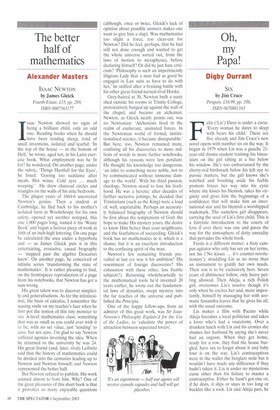The better half of mathematics
Alexander Masters
ISAAC NEWTON by James Gleick Fourth Estate, £15, pp. 289, ISBN 0007163177 Isaac Newton showed no signs of being a brilliant child, only an odd one. Reading books when he should have been tending sheep, fond of small inventions, isolated and tearful; 'In the top of the house — in the bottom of Hell,' he wrote, aged ten, in his Latin exercise book. What employment was he fit for? he wondered. On another page, under the rubric, 'Things Hurtfull for the Eyes', he listed: `Gooing too suddaine after meals. Hot wines. Cold ayre ... much weeping.' He drew charcoal circles and triangles on the walls of his attic bedroom.
The plague years of 1664-6 uncovered Newton's genius. Then a student at Cambridge, he fled back to his mother's isolated farm in Woolsthorpe for his own safety, opened yet another notepad, this one 1.000 pages long, named it his 'Waste Book' and began a furious piece of work in 16th of an inch-high lettering. On one page he calculated the area under a hyperbola and — as James Gleick puts it in this entertaining, evocative, casual biography — 'stepped past the algebra Descartes knew'. On another page, he conceived of infinite series 'transforming the state of mathematics'. It is rather pleasing to find, on the frontispiece reproduction of a page from his notebooks, that Newton has got a sum wrong.
His great talent was to discover simplicity and generalisations. As for the infinitesimal, the basis of calculus, I remember the teasing smile on my teacher's face when he first put the notion of this tiny monster to our A-level mathematics class: something that was as small as you could ever wish it to be, with no set value, just 'tending' to zero, but not zero. I'm glad to say Newton suffered agonies inventing the idea. When he returned to the university he was 24. His great friend (and, later, rival) Leibnitz said that the history of mathematics could be divided into the centuries leading up to Newton and Newton himself; and Newton represented the better half.
But Newton refused to publish. His work seemed almost to bore him. Why? One of the great pleasures of this short book is that it provokes so many enjoyable questions (although, once or twice, Gleick's lack of opinion about possible answers makes one want to give him a slap). Was mathematics too slight a force, too clear-cut for Newton? Did he feel, perhaps, that he had still not done enough and wanted to get the whole universe sorted out, from the laws of motion to metaphysics, before declaring himself? Or did he just hate criticism? 'Philosophy is such an impertinently litigious Lady that a man had as good be engaged in Law suits as have to do with her,' he sniffed after a bruising battle with his other great friend-turned-rival Hooke.
Grey-haired at 30, Newton built a nasty shed outside his rooms in Trinity College, provocatively banged up against the wall of the chapel, and became an alchemist. Newton, as Gleick neatly points out, was no Newtonian: 'Alchemists lived in the realm of exuberant, animated forces. In the Newtonian world of formal, institutionalised science, it became disreputable.' But here, too. Newton remained mute, confining all his discoveries to more millions of words in more furtive notebooks, although his reasons were less petulant. He thought his knowledge too dangerous, 'an inlet to something more noble, not to be communicated without immense damage to the world'. With his third passion, theology, Newton stood to lose his livelihood. He was a heretic: after decades of further secretive jottings, he decided that Trinitarians (such as the King) were a load of, well, unprintable. Perhaps an accurately balanced biography of Newton should be first about the temptations of God: the hope to make His mystery yours, the desire to know Him better than your neighbours, and the fearfulness of succeeding. Gleick's book has no mathematics in it, which is a shame; but it is an excellent introduction to the confusing spirit of the man.
Newton's few remaining friends prevailed at last (or was it his ambition? His resentment of foreign discoveries? His exhaustion with these other, less fixable subjects?). Returning wholeheartedly to the mathematical tools he'd invented 20 years earlier, he wrote out the fundamental laws of dynamics, swept mystery into the far reaches of the universe and published the Principia.
One of the happy follow-ups, from an admirer of this great work, was Sir Isaac Newton's Philosophy aplain'd for the Use of the Ladies, to 'calculate the power of attraction between separated lovers'.










































































 Previous page
Previous page